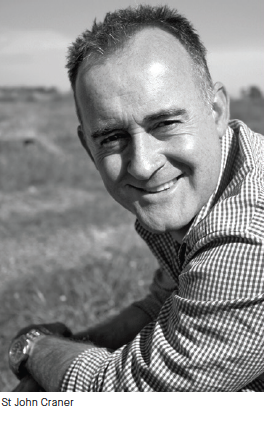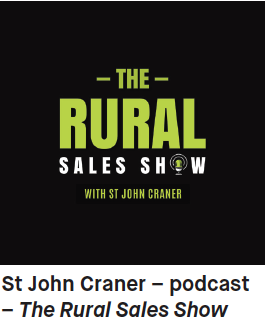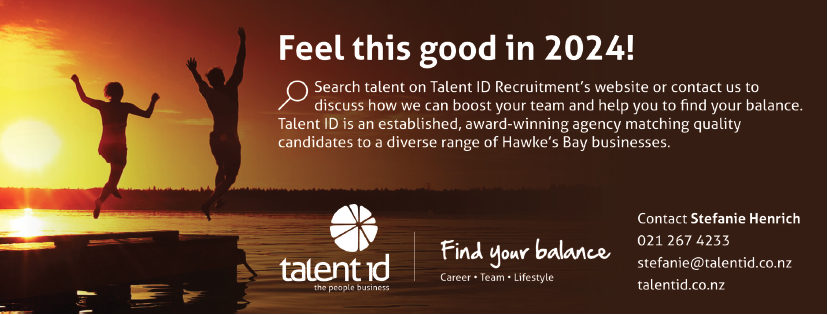Podcasting is the fastest growing media globally, creating fortunes and celebrity status for the likes of Joe Rogan, Bill Simmons, Karen Kilgraff and Georgia Hardstark (My favourite murder). There’s an oddity about sending questions to local podcasters for a written and published feature… Hawke’s Bay has some amazing podcast talent who enjoy sharing their experiences and knowledge in a particular interest area or interviewing influential people.

St John Craner is a respected marketer, specialising in the agri/primary sector who devours self-improvement books and uses his podcast The Rural Sales Show to support rural sales teams.
Why did you start a podcast?
Selfishly and honestly? For myself as I’ve always been a lifelong learner and Iearn so much from my guests. The secondary objective was to serve my audience more as I see way too many rural reps suffer in their jobs unnecessarily when there are answers out there and people or leaders who can help them. They just have to help themselves by listening and learning.
What is its theme?
Psychology, mindset, human behaviour, sales, fitness, leadership. All the things you need to have to be on top of your game. How often do you upload a podcast?Weekly where I can.
What platforms are you on?
All of them. My assistant Toni puts them out with the big two being Spotify and Apple.
How do you promote it?
Everywhere – email signature, LinkedIn, Facebook Group and my weekly email which goes out to about 5000 people each and every Tuesday.
How many followers?
A small but quality following that I’m growing which surprisingly is picking up followers in the US and UK as well as NZ and Australia. We are getting around 100 downloads an episode currently and that is tracking up as we get better guests on the show. Those two things go hand in hand. The key lesson here is to understand that a podcast is just one lead nurture channel. I can attribute at least $100k of training work to one podcast episode. Listening to them is what swung it for both decision makers. When you podcast regularly you are building a relationship with your audience. They get to spend time with you and get familiar to you and your voice so make sure you be you as everything else is taken. Plus your listeners will work out if you’re not being your true you.
What’s your objectives? Keep doing it.
Are you aiming to create podcast revenue and/or drive new business for your business?
Maybe in time. I am seeing some folk do a great job of monetising their email content using Substack. My go-tos are Janette Barnard of Prime Futures and my previous learning/content coach Michael Simmons (who I was lucky enough to get on the show episode #23).
What is easy to set up? What technology and software do you use?
I use a basic mic that goes great: AudioTechnica AT200. I also use Riverside FM as it records voices beautifully and much better than Zoom. Audio and listening quality are important for your listeners but you don’t need to go overboard and get all swanky and carried away with a top of the range recording studio. My assistant uses Audacity to edit. These three tools work for me just fine. The most important thing to do is just start.
Who is the most interesting you’ve had as a guest?
We’ve had a fair few and they all bring something different. I think the big one has been Andy Paul who is a NY Times best-selling author and top SalesForce sales coach in the US. His own podcast is in the top 1% of all podcasts and I was fortunate enough to get an invite on his show back in September that drops early this year. You’ll be surprised who you can get on your own show if you ask nicely and rate and review their podcast first, especially also if you make the effort to interact with them and support them genuinely on social media.
Who would be your ultimate interview?
Rory Sutherland who is Head of Strategic Planning at Ogilvy who is brilliant on human behaviour or Shane Parrish from an amazing podcast called The Knowledge Project (he also just published a great book called Clear Thinking). If they were alive it would have to be Alan Rickman, Sir Francis Bacon and Benjamin Franklin. Anthony Bourdain was a big loss too.
Any tips for other budding podcasters?
Content is king but consistency is key. Be mindful of your intent. Some cynics will say podcasting is self-indulgent. I disagree. If you genuinely want to help and serve your tribe, do it. That’s what will keep you doing it because you want to make an impact for others. I’ve done over 50 episodes and the target is 100 episodes by the end of 2024. Also don’t worry if you can’t get good guests at the start. Start small and use your own network as many will be willing to come on your show. Don’t be afraid to do shows on your own that express yourself and your own point of view. People who like the way you think will like it and those that don’t won’t. It also reminds me of that saying one of my guests gave me: “A thought leader is only someone who has original thoughts worth following”.
What does success as a podcaster look like to you?
Good question. A great listening and learning experience for the audience. Someone who asks very good questions of their guests and had great guests on their show. Steven Bartlett on Diary of a CEO is an exemplar of this.
What podcasts do you regularly listen to?
I have so many. I often download episodes by subscribing to shows before I go on long work trips which often take me out of reception rurally. I like my car to be my University and convert the downtime well. My absolute go-tos are The Knowledge Project by Shane Parrish and Diary of a CEO with Steven Bartlett. Others I listen to and pick from include The Psychology Podcast with Barry Kaufmann, Hidden Brain, Daily Stoic with Ryan Holiday, The High Performance Podcast and Lewis Holme’s School of Greatness. There are so many to listen to.



